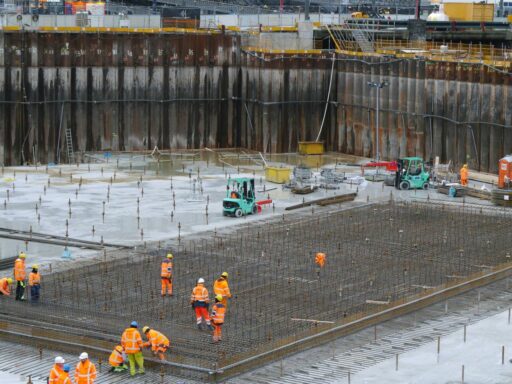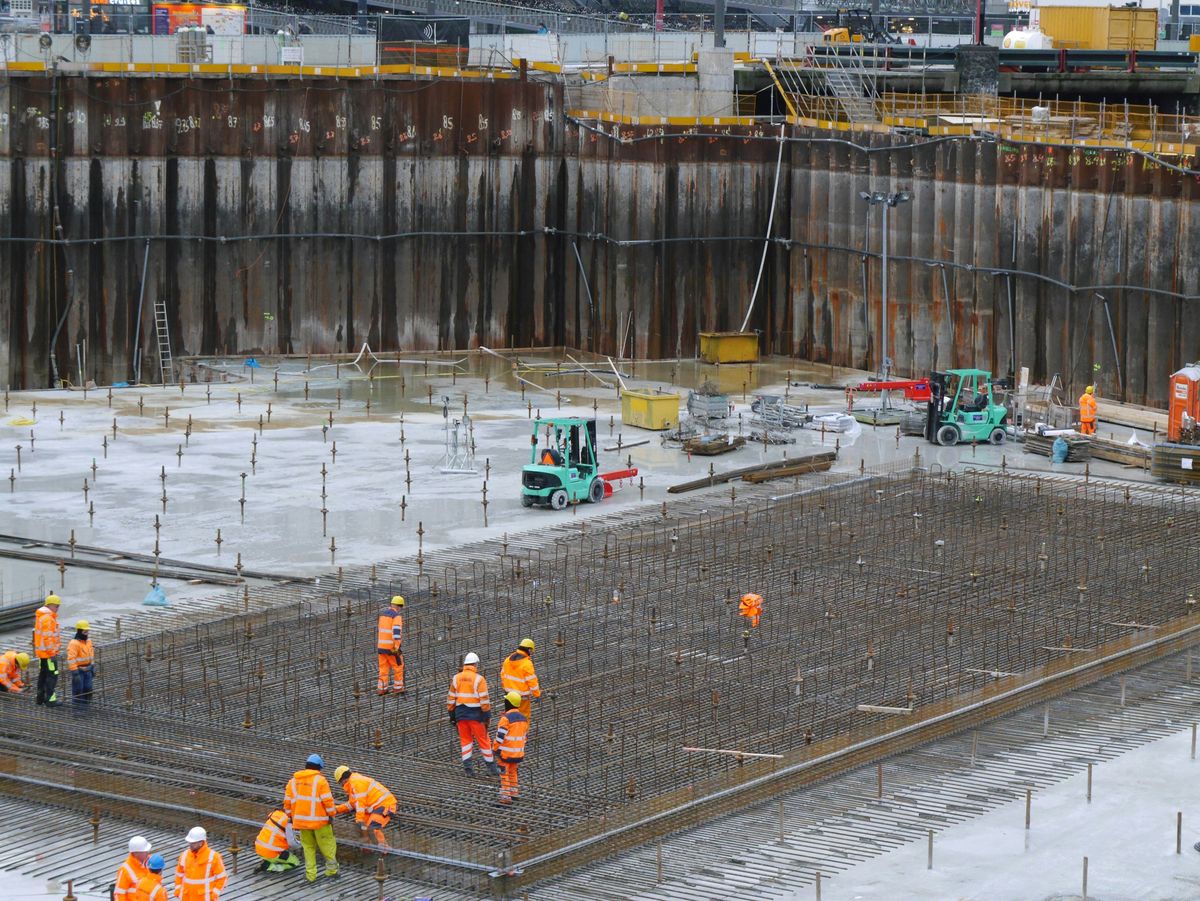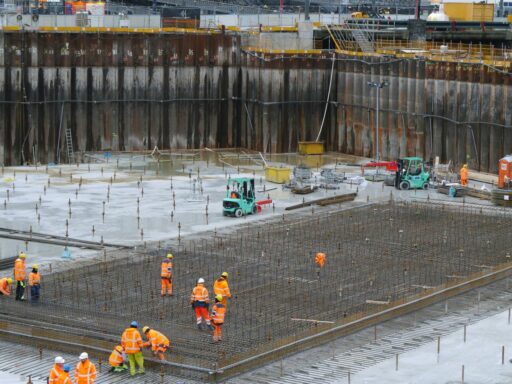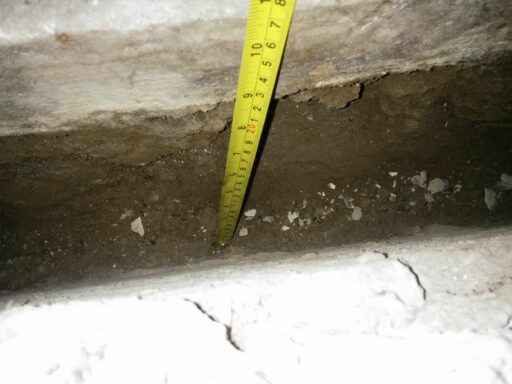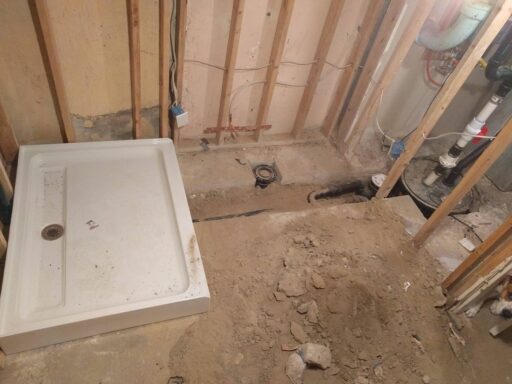Navigating the complexities of concrete construction requires a deep understanding of the trade, especially when it comes to hiring the right concrete contractors. This ultimate guide provides a comprehensive overview of what you need to know before making your hiring decisions, from the basics of concrete construction to the latest trends and innovations in the field. Whether you’re a seasoned developer or a homeowner embarking on a new project, these insights will help you choose a contractor who can deliver quality work within your budget while ensuring long-term structural integrity.
Key Takeaways
- Understanding soil types and their impact on concrete footings is crucial for a stable foundation.
- Choosing the right concrete mix and reinforcement is essential for the durability and strength of concrete structures.
- Conducting geotechnical assessments can prevent future issues by assessing soil composition and bearing capacity.
- Comparing costs and benefits of different foundation types, such as poured vs. precast, is key to budgeting effectively.
- Regular maintenance and employing proper repair methods are vital for preserving the integrity of concrete structures.
Understanding the Basics of Concrete Construction

Concrete Footings 101: Laying a Solid Foundation
When embarking on any construction project, the significance of concrete footings cannot be overstated. These foundational elements are pivotal to the stability and longevity of a structure. Here are five indispensable tips to ensure your footings are built to last:
- Understand and prepare the soil: Different soil types affect footing stability. Conduct a thorough soil assessment to determine composition and bearing capacity.
- Calculate load-bearing requirements: Accurate calculations are crucial to prevent overloading or underloading, which can compromise structural integrity.
- Select the right concrete mix: The mix should be suited to the environmental conditions and load requirements of your project.
- Reinforce effectively: Use steel bars or mesh to reinforce the footing, which helps to resist tension forces.
- Implement proper curing: Maintain adequate moisture and temperature to ensure the concrete reaches its intended strength.
Mastering the art of creating strong and durable concrete footings involves integrating these tips into your construction process. A solid foundation sets the stage for a robust and enduring structure.
Remember, a poorly executed footing can lead to significant structural issues. It’s essential to invest time and resources into getting this first step right, as it underpins the entire construction effort. Avoid relying on limited content with no specific information, such as a generic website page about Best Contractors, which may not provide the detailed guidance necessary for this critical task.
Comparing Foundation Types: Poured vs. Precast
When deciding between poured and precast concrete foundations, it’s crucial to consider the specific needs of your project. Poured foundations are created on-site, allowing for greater flexibility in design and a seamless fit to the construction area. Precast foundations, on the other hand, are manufactured in a controlled environment and transported to the site, offering faster installation and consistent quality.
- Poured Concrete:
- Customizable shapes and sizes
- Stronger bonding with the structure
- Longer curing time
- Precast Concrete:
- Quick installation
- Less labor-intensive
- May have transportation limitations
Both types have their own set of advantages and challenges. The choice largely depends on the project’s timeline, budget, and specific structural requirements. It’s essential to weigh these factors carefully to ensure the foundation you choose provides the best long-term support for your structure.
The Role of Soil Types in Concrete Stability
The stability of concrete structures is heavily influenced by the underlying soil types. Each soil type has unique characteristics that affect how it bears the weight and pressure of concrete footings. For instance, clay soils can expand and contract significantly with moisture changes, while sandy soils may offer better drainage but less cohesion.
To ensure the longevity of concrete footings, it’s crucial to implement preventative measures tailored to the identified soil type. This includes addressing potential issues such as soil erosion and settlement.
Understanding the soil composition is the first step in creating a stable foundation. A geotechnical engineer can assess the soil’s bearing capacity and other factors that may impact the construction. Here’s a quick guide to the steps involved in soil assessment and preparation:
- Soil Assessment: Engage a geotechnical engineer to evaluate soil composition and bearing capacity.
- Preventative Planning: Based on the assessment, plan for potential soil-related issues.
- Proper Compaction: Ensure the soil is compacted adequately before pouring concrete to reduce the risk of structural problems.
Remember, a solid foundation sets the stage for a robust and enduring structure, making soil assessment and preparation a cornerstone of successful construction projects.
Evaluating Concrete Contractors

10 Essential Tips for Hiring a Reliable Contractor
Hiring a reliable contractor is crucial for the success of your construction project. Here are ten essential tips to guide you through the process:
- Ensure they are licensed and insured. This is non-negotiable for a professional contractor.
- Look for a history of on-time project completion. Delays can significantly increase costs and frustrations.
- Seek out testimonials and reviews from previous clients to gauge satisfaction.
- Confirm that they provide a clear and detailed quote to avoid unexpected expenses.
- Ask for a single point of contact to streamline communication and accountability.
A reliable contractor will not hesitate to provide proof of insurance and licensing, as well as a portfolio of past work.
- Ensure they are willing to stand by their quote and not deviate without proper justification.
- Check if they are easy to contact and responsive to inquiries and concerns.
- Discuss your design inspirations and expectations upfront.
- Inquire about their policy on meeting deadlines and handling any potential delays.
- Finally, make sure they are committed to quality workmanship and offer a warranty on their services.
When reviewing potential contractors, be wary of those with a Website page about Best Contractors with limited content and no specific information. A reputable contractor will have a comprehensive portfolio and transparent information about their services.
The Importance of Geotechnical Assessments
Geotechnical assessments are a cornerstone of any successful concrete construction project. Engaging a geotechnical engineer is a critical step in ensuring the stability and longevity of your structure. These professionals are adept at analyzing soil composition, bearing capacity, and identifying potential issues such as erosion or settlement.
A thorough geotechnical assessment can preemptively address issues, setting the stage for a robust and enduring foundation.
Understanding the natural conditions of a project site is essential. The whims of the earth beneath can significantly impact the overall quality and resilience of concrete footings. Here are some key considerations:
- Soil Types: Different soils react differently to weight and pressure, influencing footing stability.
- Concrete Mix: Tailoring the mix to project requirements is crucial for footing strength and durability.
- Preventive Measures: Proper soil compaction and addressing potential soil issues can mitigate future structural problems.
Questions to Ask Before Hiring Design Build Contractors
When considering a design-build contractor for your project, it’s crucial to conduct a thorough interview to ensure they meet your specific needs. Ask about their contractor’s license and insurance to verify their legitimacy and protect yourself from potential liabilities. Inquire about their experience and past work to assess if their style resonates with your vision.
- Do they have a contractor’s license?
- Are they insured and bonded?
- Can they provide examples of past work similar to your design preferences?
It’s a red flag if a contractor cannot name preferred subcontractors or hesitates to confirm that you’ll be signing a single contract. A streamlined process is one of the key benefits of a design-build approach.
Ensure that the contractor offers a single point of contact throughout the project to facilitate clear and consistent communication. This can significantly reduce misunderstandings and project delays. Remember, the right questions can lead to a successful partnership and a smoothly executed project.
Innovations and Trends in Concrete Projects

Top 2024 Retaining Wall Ideas and Innovations
As we move into 2024, the trends in retaining wall design are increasingly leaning towards integrating natural elements into our outdoor spaces. This year, we’re seeing a surge in the use of materials that offer a natural texture and aesthetic, such as brick, stone veneer, flagstone, and specially designed retaining wall blocks. These materials not only enhance the visual appeal of your landscape but also contribute to a sense of harmony with the surrounding environment.
Innovations in retaining wall construction are also focusing on sustainability and ease of installation. Here’s a quick overview of some of the key innovations:
- Modular retaining wall systems: These systems are designed for quick and easy installation, reducing labor costs and construction time.
- Self-aligning blocks: New block designs ensure proper alignment and fit, simplifying the building process.
- Eco-friendly materials: The use of recycled or sustainably sourced materials is becoming more prevalent, reflecting a growing environmental consciousness.
When planning your retaining wall project, consider these innovations to not only create a stunning visual impact but also to contribute to a more sustainable and efficient construction process.
Cost-effectiveness is another important aspect of retaining wall construction. While the initial investment in high-quality materials and innovative designs may be higher, the long-term benefits of durability and low maintenance can lead to significant savings.
How Paver Patio Construction Enhances Outdoor Spaces
Paver patios are more than just a trend; they are a practical and stylish addition to any outdoor area. Transforming your outdoor space with paver patio construction not only enhances aesthetics but also boosts functionality and overall enjoyment.
- Aesthetics: Pavers come in a variety of colors, shapes, and textures, allowing for custom designs that complement your home’s exterior.
- Durability: Unlike other materials, pavers are designed to withstand the elements, from extreme heat to freeze-thaw cycles.
- Low Maintenance: Pavers require minimal upkeep compared to other patio materials, making them a cost-effective option in the long run.
- Versatility: Whether you’re looking to create a cozy fire pit area, an elegant outdoor dining space, or a simple pathway, pavers offer the flexibility to realize your vision.
Paver patios can significantly increase the value of your property by improving its curb appeal and providing an attractive outdoor living space that potential buyers or renters find appealing.
When considering paver patio construction, it’s important to work with professionals who can ensure proper installation. This includes preparing the base correctly to prevent settling and shifting, and choosing the right materials for your climate and soil type.
Benefits of Professional Concrete Slab Installation
Opting for professional concrete slab installation brings a multitude of benefits that go beyond mere aesthetics. Professionals ensure a pest-free environment by sealing potential entry points during installation, which can deter pests and provide long-term protection for your home. Additionally, the durability and cost efficiency of a professionally installed slab can’t be overstated.
When it comes to concrete slab installation, the expertise of a professional contractor is invaluable. They have the knowledge to select the right materials and the skills to execute the installation flawlessly, ensuring that the slab serves its purpose effectively for years to come.
Here are some key advantages of professional installation:
- Quality Assurance: A professional’s workmanship guarantees a high-quality finish that lasts.
- Time Efficiency: Experts can complete the job faster due to their experience and specialized equipment.
- Cost-Effectiveness: While DIY might seem cheaper, professional installation can prevent costly mistakes and future repairs.
- Customization: Contractors can tailor the slab to your specific needs and preferences.
In conclusion, the benefits of hiring a professional for concrete slab installation are clear. It’s an investment in the longevity and integrity of your property.
Cost Considerations in Concrete Construction

Comparing Concrete Foundation Costs
When planning for a new construction project, understanding the costs associated with different types of concrete foundations is crucial. Poured concrete foundations are typically known for their adaptability to various site conditions and can be more cost-effective in the long run due to their durability. On the other hand, precast concrete foundations, while potentially offering quicker installation times, may come with higher initial costs.
The choice between poured and precast concrete foundations should be made after careful consideration of both the short-term and long-term financial implications for your project.
Here’s a simplified cost comparison to help guide your decision:
| Foundation Type | Initial Cost | Longevity | Installation Speed |
|---|---|---|---|
| Poured Concrete | Moderate | High | Moderate |
| Precast Concrete | High | Moderate | Fast |
Keep in mind that these costs can vary based on regional prices, the complexity of the project, and the current market conditions. It’s advisable to get multiple quotes and consider the total value each option brings to your project.
Budgeting for Your Concrete Project
Budgeting for a concrete project requires careful consideration of various factors that influence the overall cost. Identifying all potential expenses upfront can prevent budget overruns and ensure financial preparedness.
When planning your budget, consider the following:
- Type of concrete project (e.g., foundation, patio, retaining wall)
- Size and complexity of the project
- Material costs, including the type of concrete and reinforcement
- Labor costs, which can vary based on the contractor’s experience and region
- Equipment rental or purchase if not provided by the contractor
- Permitting fees and any additional costs for legal compliance
It’s crucial to allocate a contingency fund, typically 10-15% of the total budget, to cover unexpected expenses that may arise during the construction process.
Lastly, request detailed quotes from multiple contractors to compare prices and services. This will not only give you a clear understanding of the market rates but also provide leverage when negotiating with your chosen contractor.
Understanding Long-Term Savings with Quality Installation
Investing in quality concrete installation may come with a higher upfront cost, but it is crucial to consider the long-term savings that result from such a decision. A well-constructed foundation or slab ensures fewer repairs and maintenance needs over the lifespan of the structure, translating into significant cost savings.
By prioritizing quality installation, homeowners and property managers can avoid the frequent and often costly repairs associated with poor construction. This proactive approach not only preserves the structural integrity but also maintains the property’s value.
Understanding the financial benefits requires a comparison of potential costs over time. Here’s a simplified breakdown:
- Initial installation with high-quality materials and professional workmanship may be more expensive.
- Subsequent years typically see minimal maintenance costs due to the durability of the installation.
- Over a decade or more, the total cost of ownership is often lower for quality installations due to reduced repair and replacement needs.
It’s clear that the initial investment in professional concrete installation pays off. Property owners should not overlook the importance of skilled contractors and proper materials to ensure lasting benefits.
Maintenance and Repair of Concrete Structures

Top Concrete Foundation Repair Methods for 2024 Homes
As we move into 2024, homeowners are looking for innovative and durable solutions to repair their concrete foundations. Hydraulic cement has emerged as a particularly effective material for addressing larger foundation cracks. It expands as it cures, ensuring a tight seal and preventing further damage.
Homeowners should prioritize identifying the root cause of foundation issues to implement the most effective repair method.
Another method gaining traction is the use of advanced sealants and epoxies, which offer flexibility and strength, adapting to minor movements within the structure while maintaining a waterproof barrier. For comprehensive repairs, contractors may also employ underpinning techniques to provide additional support where the original foundation is no longer sufficient.
Below is a list of common repair methods and their typical applications:
- Hydraulic Cement: Ideal for larger cracks and voids
- Sealants and Epoxies: Best for smaller cracks and waterproofing
- Underpinning: Used when original foundation support is inadequate
Each method has its own set of advantages and should be chosen based on the specific needs of the structure and the extent of the damage.
Ensuring the Strength and Durability of Concrete Footings
The longevity of concrete footings is heavily influenced by the choice of concrete mix and the implementation of proper reinforcement techniques. Selecting the right concrete mix is crucial, as factors like aggregate size, water-cement ratio, and admixtures determine the mix’s strength and resilience.
Proper reinforcement, such as the use of rebar or mesh, is essential for withstanding various stresses. It’s not just about adding reinforcement but also about its correct placement within the concrete matrix to enhance the structural integrity of the footings.
Accurate load-bearing calculations are paramount for the integrity of concrete footings. Overloading or underloading can lead to structural issues, making it essential to assess the specific load-bearing needs of your project.
Additionally, effective curing practices, including maintaining appropriate moisture levels and preventing premature drying, contribute significantly to the final strength and durability of the concrete footings.
Preventive Measures for Long-Term Concrete Integrity
Ensuring the longevity and integrity of concrete structures begins with preventative measures tailored to the specific soil type. Strategic planning to combat soil erosion, settlement, or expansive soils is crucial. Proper soil compaction prior to concrete pouring is a key step in preventing future structural issues, setting a solid foundation for durable concrete footings.
Adequate curing and moisture control are paramount for the concrete’s long-term stability. These processes are not just about achieving the designed strength; they are about preventing cracks and enhancing density, which are vital for enduring concrete footings.
Moisture control strategies include protecting footings from extreme weather, using coverings, and avoiding premature drying. These measures significantly contribute to the concrete’s final strength and durability:
- Proper alignment, bracing, and securing of formwork to prevent leaks and maintain concrete integrity.
- Addressing formwork issues such as inadequate support or misalignment.
- Ensuring a meticulous approach to formwork installation for lasting results.
Conclusion
Hiring the right concrete contractor is crucial for the success of any construction project. From understanding the importance of strong and durable concrete footings to comparing costs and methods for foundation repair, this guide has aimed to equip you with the knowledge to make informed decisions. Remember to consider the soil type, choose the appropriate concrete mix, and ensure proper reinforcement and curing. By following the tips and insights provided, you can ensure that your construction project stands on a solid foundation, both literally and figuratively. As you move forward, take the time to vet potential contractors thoroughly, ask the right questions, and prioritize quality and reliability to achieve the best results for your investment.
Frequently Asked Questions
What are the essential tips for ensuring strong and durable concrete footings?
To ensure strong and durable concrete footings, it’s important to assess and prepare the soil, understand soil types, calculate load-bearing requirements, select the right concrete mix with appropriate aggregate size and water-cement ratio, reinforce effectively, and implement proper curing and moisture control.
How do I choose between poured and precast concrete foundations?
Choosing between poured and precast concrete foundations depends on factors like cost, time, labor, and the specific needs of your project. Poured foundations offer customization and strong site bonds, while precast options provide speed and consistency. Evaluate both in terms of long-term performance and upfront investment.
What should I ask potential design build contractors before hiring?
Before hiring design build contractors, ask about their experience with similar projects, their project management process, timeline, and budgeting approach. Inquire about their licensing, insurance, and references. Also, discuss communication methods and how they handle changes or unexpected issues during the project.
What are the benefits of professional concrete slab installation?
Professional concrete slab installation ensures a durable, level, and structurally sound base for your construction project. Benefits include long-term protection against pests, cost efficiency, and the avoidance of common DIY mistakes that can lead to expensive repairs or the need for premature replacement.
How can I maintain and repair my concrete foundation to ensure its longevity?
Maintain your concrete foundation by keeping the area around it dry and well-drained, regularly inspecting for cracks or signs of movement, and promptly addressing any issues. Repair methods for 2024 homes include epoxy injections, carbon fiber reinforcement, underpinning, and hydraulic lifting for settled foundations.
Why is a geotechnical assessment important when hiring a concrete contractor?
A geotechnical assessment is crucial as it provides detailed information about the soil composition, bearing capacity, and potential issues like erosion or settlement at the construction site. This information helps the contractor design and construct a foundation that is stable, durable, and suited to the site conditions.
